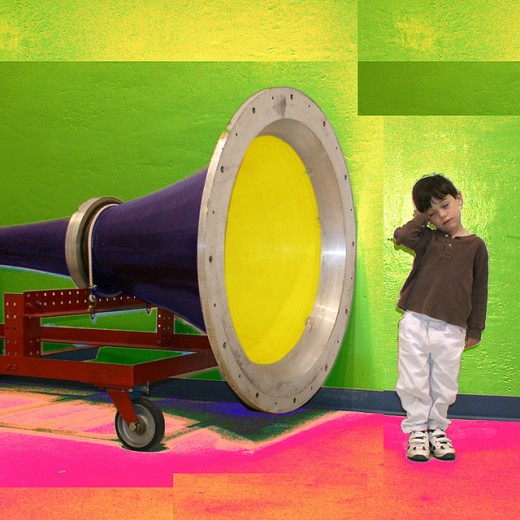Auditory Processing Disorder & Asperger's Syndrome
The Dynamic Duo: Uncoordinated & Awkward
When a person lives with Asperger's Syndrome, they may be functional and get by, but not without a lot of gaffes and hard lessons along the way. Being on the autism scale, no matter how high or low functioning, is frustrating for everyone involved.
Now add the symptoms of Auditory Processing Disorder and you have the dynamic duo of being uncoordinated on many levels, and being awkward in social settings and learning arenas.
In a society where everyone seems to have one disorder or another, this article is not to make excuses for anyone, but if you know someone who is tagged by "in one ear and out the other," perhaps this will shed light on why.

What Causes APD?
- No one knows for sure!
- Could be hereditary
- Maybe head trauma
- Chronic ear infections, perhaps
Who cares?
At this point you just have to deal with it.
Moving forward...
What is Auditory Processing Disorder?
According to the National Center for Learning Disabilities, APD, also known as Central Auditory Processing Disorder (CAPD), is a complex auditory disorder than affects up to 5% of school-aged children. Sometimes this is a lifelong challenge where there is a disconnect of what the person hears and how they process the information. This does not mean that hearing loss is involved. In fact, one might say a person with APD has normal to exceptional hearing but they either do not remember what they just heard, cannot comprehend, or simply ignore sounds, especially speech, as white noise.
Because of the inability, or challenge, to pay attention while someone is talking, oftentimes the person with APD misses information and is perceived to be daydreaming. The condition, like Asperger's, may adversely affect their ability to interact with people because social and audio cues elude them.
Imagine being in a classroom or lecture hall with this condition: the instructor will eventually sound like the teacher from the old Peanuts cartoon, "Wah Wah, Wah-Wah."
Detecting APD
By knowing the signs and symptoms, you can help children and adults focus and comprehend what is being said - but it may take a few tries and thinking outside the box. Mentioned previously, people with APD will pass a hearing test because they are listening to solid tones. Remember, they aren't deaf.
Sadly, the symptoms are very similar to Attention Deficit Hyperactive Disorder (ADHD) and may be a contributing factor to learning disabilities, problems with speech, the severity of autism/Asperger's, and even depression. Children and adults with this auditory deficit may have speech delays and larger academic obstacles.
As with the autism scale, symptoms of APD will range from mild to severe. To add to the difficulty of properly diagnosing APD, processing sound manifests in different ways for each individual.

A Night Out
"That was a great movie!"
Oh yeah? What was it about?
"I have no idea."
APD Through the Ages
Keep in mind that this is a disability in listening, then translating for comprehension. This is not a hearing problem.
There are common factors of APD that are carried through, no matter what age you are.
- Easily distracted especially in noisy environments
- Better concentration & performance in a quiet atmosphere
- Difficulty with following directions or taking notes
- Snowball effect of not listening affecting spelling, writing, and/or speech
- Challenged in effective communication
- Word problems in math/logic questions
- Seemingly disorganized and often forgetful
Early to School-Aged
- Sensitivity to noise, especially sudden noise
- Immediately forgetful
- Trouble remembering: instructions, stories, songs, or movies
- Straining to stay focused when someone is monologuing
- Problems remembering people’s names or facts
- Difficulty understanding people who talk too fast
- Struggling to find the right words or "losing" words
Teens to Adulthood
- Over annunciation or speaking louder than necessary
- Difficulty remembering things by rote
- Breakdown in communication/effective listening
- Often too literal
Never Stops for Directions
"I never stop to ask for directions anymore."
"Why not?"
"Because every time I did, they talked too fast. Even the simplest directions were forgotten by the time I got back in the car."
"Why didn't you just write everything down?"
"I've tried that too! I can't write fast enough. I tried shorthand, but then I can't read what I wrote. If I was lucky, I knew which way to turn out of the parking lot. Thank goodness for my GPS or I would still be driving around."
Getting A Diagnosis
Like high-functioning autism, CAPD might not be immediately noticed because the severity is different with every child. Observation on the home front, and later, by instructors in school, is the crucial first step for a proper diagnosis.
This goes beyond the pitch & frequency testing. Again, people with APD are not deaf. An audiologist is necessary to perform auditory processing testing to diagnose a problem.
What does the testing cover?
That depends on the audiologist. There are four main things to consider:
Phonological Segmentation: The ability to break words into individual sounds. Example: "Cat" = individually sounding out each letter phonetically with a hard /k/ . /æ/ . /t/
Phoneme Blending: Combining units of sound to pronounce and further comprehend the word. This could be combining two words like /base/ and /ball/ and understanding that you mean a baseball, or offering two+ syllables to see if they can put it together to make a word, like /ha/ . /ppy/
Auditory Comprehension: The ability to comprehend words, and Auditory Reasoning: The ability to perceive, draw conclusions, make inferences, and use judgment from what they hear.
Additional testing may include, but are not limited to: word memory, sentence memory, giving verbal commands and testing memory and retention.
How do you treat CAPD?
Unfortunately, like high-functioning autism or Asperger's, there is no uniform way to test, diagnose or treat APD. Each case is unique. Once diagnosed, however, the individual may work with a speech therapist and audiologist. If young enough and still in school, an Individualized Educational Plan (I.E.P.) may be required. As an adult, unless you are severely disabled, there are very few programs available. Testing can be done for an official diagnosis and finding ways to better cope are in order - especially if you do not qualify for disability or government assistance.
SQUIRREL!!!
A Baker's Nightmare
"I must have baked this recipe a million times. You would think I would have it memorized by now!"
What's the problem?
"If I don't go down the list exactly and just do one ingredient at a time, I inevitably forget something - and then it's ruined. I go back and forth, and back and forth, reading and double checking to make sure I'm doing it right. It's very frustrating!"
What can I do if I know someone with APD?
Some of these strategies might sound very familiar if you are currently working or living with someone on the autism scale. These can be applied at home, school or work.
- Keep background noise to a minimum
- Use simple words and phrases, graduating to more difficult ones as they comprehend
- Speak slower and annunciate
- Have them repeat what you said
- Make a checklist of tasks and make sure they follow through
- Stay organized and keep a steady schedule
- Ask for visual aids, itinerary or syllabus for orated subjects
- Teach them to be more proactive - like moving to a quieter location so they can better pay attention
CAPD is real and oftentimes a life-long struggle. Coping skills and learning techniques are all that is necessary to stay on track. Keeping a positive attitude and a willingness to think outside the box will go a long way in raising their self-confidence.
Remember: They cannot control what they cannot remember or understand. What they can control is recognizing they have a problem and then finding appropriate paths to understanding.
It is quite possible to live a successful life with APD and/or high-functioning autism.
Resources
Kids Health http://kidshealth.org
National Center for Learning Disabilities http://ncld.org
Reynolds, C. R., Voress, J., & Pearson, N. (2008). Developmental test of auditory perception.








